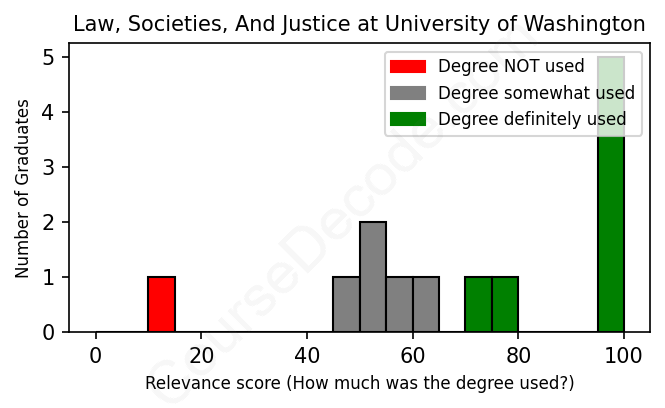
First, some facts. Of the Law, Societies, And Justice graduates from University of Washington we've analyzed , here's how many have used (or NOT used) their degree in their career:

These are estimates based on AI analysis of 13 LinkedIn profiles (see below).
The verdict? Slightly below average. Overall, with an average relevance score of 66%, Law, Societies, And Justice graduates from University of Washington have a slightly lower likelihood (-1%) of finding work in this field compared to the average graduate across all fields:
And for comparison, here's the chart for all profiles we've looked at across all degrees.
Also, after graduating, 60% of these graduates have pursued further education other than another Bachelor's degree (such as a Masters degree or other), compared to the average across all profiles of 35%. This suggests you may need more than just a Bachelors degree to be competitive as a Law, Societies, And Justice graduate.
See the details:
|
Relevance score: 100% We think this person has gone into a career highly relevant to their degree. We think this person has gone into a career highly relevant to their degree.
DEGREE INFOGraduated in 2011 from University of Washington with a Bachelor of Arts and Sciences in Law, Societies, And Justice. Also pursued further education since (see below). JOB HISTORY SINCE GRADUATIONLegal Extern Adminstrative Office of the Courts Sep 2015 - Dec 2015 Legal Intern  Moderate Means Program May 2015 - Apr 2016 Legal Extern  Columbia Legal Services Jan 2016 - Apr 2016 Assistant Project Manager  JND Legal Administration Apr 2019 - Mar 2020 Attorney  Granite Spire Law Group Mar 2020 - Oct 2021 Volunteer Attorney  KCBA Neighborhood Legal Clinic Apr 2018 - Present Of-Counsel  ANAdeeds.com May 2018 - Present Attorney  Lyda Group May 2023 - Present FURTHER DEGREES DONE SINCE GRADUATINGLawSeattle University School of Law 2013 - 2016 ABOUTNo information provided. |
The top 10 most common jobs done by the graduates we've analyzed (ranked most common to least) are:
When we look at the job paths for graduates with a degree in Law, Societies, and Justice from the University of Washington, a couple of clear trends emerge. Many graduates have gone on to work in roles that are very much aligned with legal work—like attorneys, judicial clerks, legal interns, and externs. These positions are directly relevant to their studies and often involve applying the legal principles they learned during their degree. For example, several individuals have taken up roles in legal organizations or government agencies where they actively engage with courts or help in providing legal assistance. This shows that a good number of these graduates are using their education in a meaningful way that relates to law and social justice.
However, it’s worth noting that a fair number of graduates have ended up in roles that don’t really connect to their degree. There are those who work in financial sectors, administrative positions, or even non-legal specific roles in healthcare and hospitality. These positions often don’t tap into the legal knowledge they acquired in school, which can be a bit disappointing for anyone expecting a direct application of their education. Overall, while there are strong representations in legal and justice-related fields, there are also significant numbers who have not utilized their law degree in their careers. So, in short, the picture is mixed—lots of engagement with law, but also substantial shifts into other areas that don’t directly relate to what they studied.
Here is a visual representation of the most common words in job titles for Law, Societies, And Justice graduates (this is across all Law, Societies, And Justice graduates we've analyzed, not just those who went to University of Washington):

Looking at the career paths of graduates from the University of Washington's Law, Societies, and Justice program, it seems like there's a range of experiences, especially in the early years after graduation. Many of these graduates land internships or entry-level positions related to law, like legal assistants, interns at law firms, or clerks in judicial settings. A good chunk of them also start working as attorneys in various capacities, from public defense to corporate law. For instance, graduates from 2010 and 2011 quickly transitioned into positions like litigation attorneys and legal externs, which shows they were able to leverage their degrees into relevant legal careers right after school. However, some took a detour into fields that aren't directly related to law, like physical therapy, which is a bit off the standard track you might expect from this type of degree.
Fast forward five to ten years, and while many have progressed into solid legal careers—becoming associate attorneys, directors in asset management, or even public defenders—there are also those who have shifted into roles that, while they may benefit from their legal background, aren't strictly in the legal field. For instance, some have taken positions in areas like asset management, project management, and even non-profit work. Overall, the trajectory for many seems to be upward within the legal field, but there is also a notable diversity of paths taken, which might suggest that graduates are finding their own unique ways to apply their education beyond traditional roles. It’s a mixed bag, but there are plenty of success stories in law-related careers!
The Bachelor’s degree in Law, Societies, and Justice at the University of Washington isn’t exactly a walk in the park, but it also isn’t the toughest major out there. It kinda falls in that middle ground where you’ll definitely have to put in some effort, especially when it comes to reading, writing, and engaging with complex social issues. You’ll tackle topics like justice systems, societal norms, and law, which can get pretty intense at times. So, if you’re someone who enjoys digging deep into these subjects and can handle some challenging assignments, you’ll likely find it manageable. Just be prepared to stay organized and dedicated, and you should do just fine!
Most commonly, in the LinkedIn profiles we've looked at, it takes people 4 years to finish a Bachelor degree in Law, Societies, And Justice.
Looking at the career paths of these University of Washington Law, Societies, and Justice graduates, it seems that some are definitely making decent money, especially those who have pursued traditional legal careers, like the litigation attorney and the various roles in public defense and asset management. On the flip side, others like the recent grads are still working their way up in fields that might offer less immediate financial reward, like law clerks and those in administrative roles. The physical therapists seem to be doing alright too, but their salaries can vary quite a bit. Overall, if they’re on the law track, they’re likely seeing a pretty solid paycheck eventually, while those doing more entry-level or transitional jobs may not be raking it in just yet. It's a mixed bag, but the future looks promising for those who hang in there!
Here is a visual representation of the most common words seen in the "about" section of LinkedIn profiles who have a Bachelor degree in Law, Societies, And Justice (this is across all Law, Societies, And Justice graduates we've analyzed, not just those who went to University of Washington). This may or may not be useful:

Here are all colleges offering a Bachelor degree in Law, Societies, And Justice (ordered by the average relevance score of their Law, Societies, And Justice graduates, best to worst) where we have analyzed at least 10 of their graduates:
| College | Score | Count |
|---|---|---|
 University of Washington University of Washington
|
66 | 13 |